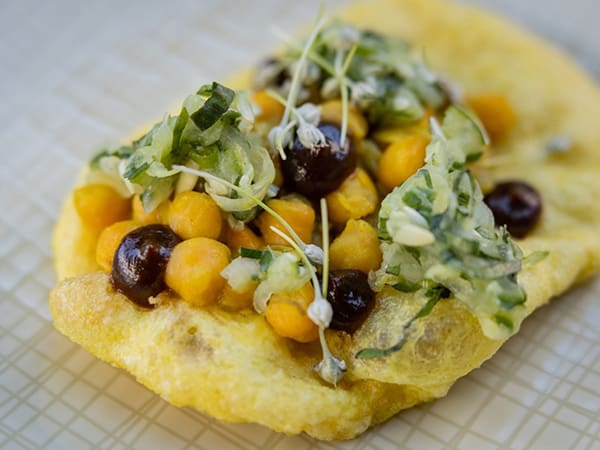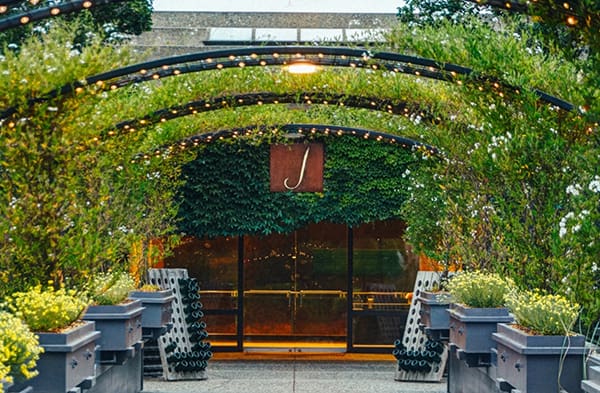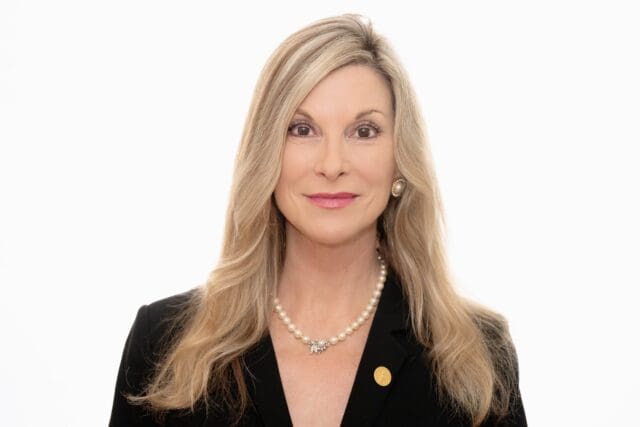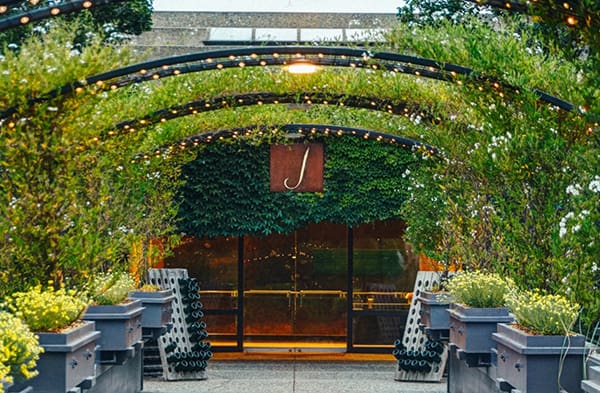By Dr. Liz Thach, MW
Chef Rashida Holmes grew up enjoying the delicious Afro-Caribbean soul food recipes passed down by her Barbadian mother and grandmother. She remembers when she was three years old and tasted her first cod cake made by her grandmother:
“It was like a flavor bomb that hit my pallet, with all those textures and Caribbean spices,” she said. “So I want you to try it with this glass J’s 2017 Blanc de Blancs. I worked with winemaker Nicole Hitchcock to find the perfect pairing. What do you think?”
All the visitors who attended this special wine and food pairing experience at J Winery duly listened to Rashida and then there were gasps of delight and surprise around the room as they tasted the cod cake and sparkling wine together. As a participant in the crowd, I must admit that this was my first time attending an Afro-Caribbean soul food and wine pairing session, and the experience was not only deliciously tantalizing, but also very educational and entertaining.
J Winery’s ‘Shifting the Lens’ program
Rashida is one of many talented chefs who have been invited to participate in J Winery’s Shifting the Lens program. In its third year, the program features celebrity chefs who specialize in cuisine from a particular culture, such as Vietnamese, Mexican, Japanese, Indian and others.
The chef spends a week at J Winery and works with winemaker Nicole Hitchcock to pair their recipes with different J wines. At the end of the week, a number of food and wine experiences are offered to wine club members and visitors. There are two afternoon slots each day on Thursday and Friday, one on both Saturday and Sunday (2.5 hours), and then two special dinner events on Saturday and Sunday evenings (3 hours), which often sell out.
The concept is revolutionary for the wine industry because instead of offering visitors a traditional food and wine pairing experience centered around European cuisine, Changing the lens focuses on pairing wine with many different ethnic cuisines.
Interestingly, pairing wine with ethnic cuisine is one of the key findings of our Wine Market Council (WMC) research study focused on how to attract more young adults and multicultural consumers to wine. Young American multicultural adults interviewed for the study suggested “why isn’t the wine industry talking about wine paired with food from my culture?” (Note: I am also president of WMC, a non-profit organization that conducts research on the American wine consumer.)
Now J Winery has taken a leadership role in pairing wine with multicultural cuisine. In fact, the program is so groundbreaking that they won a 2023 Sonoma County Tourism Innovation Awardwhich recognizes their work in developing an inclusive atmosphere and promoting diversity in the wine industry.
The program benefits consumers, local farmers, employees and students
“We started Changing the lens program three years ago and it came out of a brainstorming session with our team here at J Winery who wanted to do something creative and inclusive,” stated Michael Pollock, VIP Consumer Experience Rep with J, who was on hand at the event.
“The feedback from consumers has been very positive and we see people coming back a second and third time to experience the cuisine of new chefs,” he said. “Our team also enjoys learning from the different chefs and trying the delicious cuisines.”
Corey Handa, Tasting Room Lead at J Winery, who served the food and wine at the tasting, commented, “As an employee here, I feel so fortunate to have the opportunity to listen to these talented chefs and taste these amazing pairings. We have all learned so very.”
But the experience is not only positive for consumers, staff and the visiting chef (which expands their brand recognition), but also for local farmers. “During the first part of the week, the chef visits local Sonoma County farms with our Executive Chef, Forest Kellogg, who acts as a guide and mentor during their visit. This way, they learn about the exceptional fresh vegetables, fruits, cheeses and meats, that can be bought locally,” explained Michael Pollack.
J Winery has also donated $30,000 annually in the name of Changing the lens to the SRJC Shone Farm Agriculture Education Fund. The money is used to fund three students doing work placements at SRJC Shone Farm for the academic year.


Learn about the history of Afro-Caribbean soul food
Rashida Holmes, who grew up in New York, now has her own restaurant, Bridgetown Roti, in Los Angeles. During the pandemic, she had great success creating pop-up restaurants online and in various locations, and she has been involved in The New York Times, Bon Appetit, Wall Street Journall, and other businesses. She was one too 2024 James Beard Award Semifinalist for Outstanding Chef.
Passionate about the food history of the Caribbean, Rashida shared stories about each of the five small plate tastings paired with a different J wine. Here are a few of her food history lessons:
Plantains placed on slave boats as cheap food – “Barbados is the first island you hit after leaving Africa, so most American soul food started in the Caribbean. Interestingly, plantains – originally from Asia – were put in the boats as a cheap food source to feed the slaves. When the plantain plants first came to the Caribbean, they became a staple food,” explained Rashida.
For the plantain course, Rashida topped a fried plantain with Shrimp Escabeche, Mango Chow, Green Spice and Turmeric Curry Spice. Paired with 2022 J Estate Pinot Gris it was truly mouth-watering, with the spicy food enhancing the floral and pear notes in the wine.
Caribbean fried bread originally from India: Rashida shared a harrowing story about the life expectancy of African slaves working in the sugar fields of Trinidad: “The work was so hard that most slaves lived only nine years, so they had to bring in workers from India. These workers brought fried bread from India and now you can find it for sale next to any road in Trinidad.
For the fried bread course, Rashida topped it with curried chickpeas, cucumber chutney, tamarind vinaigrette and onion blossoms. It was a nice foil too 2013 J Blanc de Noirs, with the wine’s structured bubbles cleansing the palate for another taste of the salty chickpeas and fried bread.
Goat is the most sustainable meat in the world: According to Rashida, goat is the most common protein in the world, but not in America. “It’s a shame,” she said, “because it’s the most sustainable meat in the world. Goats eat a lot of weeds and they don’t tear out root systems. But goat meat has to be cooked right, so I like to marinate it in red curry sauce and then smoke it for a long time.” (It turns out that goats also require less space than cattle and have lower greenhouse gas emissions.)
Rashida served her Red Pepper Goat with West African Peanut Sauce, Callaloo Greens, Young Coconut Chutney, Cabbage Slaw and Paratha Roti. She and Nicole chose wisely in 2017 Edition No. 2 Pinot Noir to pair with this dish and it was truly brilliant at work. The fruity notes of the pinot with well-integrated oak were able to withstand the smoky curry flavor of the goat, creating a symphony on the palate.
Rashida concluded the tasting by saying, “It’s nice to be here in Sonoma County to slow down and enjoy food and wine. It’s also impressive that J Winery is at the forefront of shaping wine and food pairings in the country with different kitchens.”


J Winery’s final ‘Shifting the Lens’ program this week – 17-20 October 2024
For the 2024 season, one more chef is still planned for his week-long residency – Chef Damarr Brown will present Southern traditions paired with J wines from the 17th-20th. October 2024. Damarr received 2023 James Beard Award for Emerging Chef and Food & Wine Magazine’s Best New Chef in America 2022and directs a renowned culinary program in Chicago.
The price for the 2.5 hour 5-course tasting menu is $200 for the public ($175 for club members) and the nearly sold-out dinners (3 hours for 5-course with both Chef Damarr and winemaker Nicole, in attendance) are $250 for the public ($225 for club members).
So what are the results of Changing the lens program after running for three years? According to Michael Pollock, “The customers love it. The feedback has been great. It keeps our wine club members coming back for repeat visits, introduces visiting chefs to local farmers, and brings visiting chefs to Sonoma County that has cuisine that doesn’t compete with local chefs .”
“Our plan for the future is to continue the program – to expand our reach, expand the selection of wines and continue to promote inclusivity and diversity,” he concluded.
______________________________________________________________________________________________________________________


Dr. Liz Thach, MW
Dr. Liz Thach, MW, is a professor, wine writer and president of the scientific non-profit, Wine Market Council. She has published more than 300 articles, 9 books and lives in Sonoma County.
